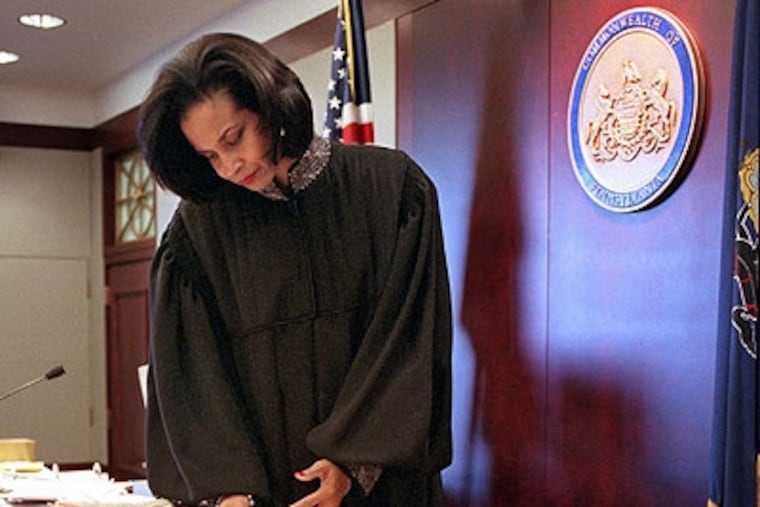A judge’s mistake in jury instructions has upended several murder cases and could soon set a killer free
Faulty jury instructions given for years by Philadelphia judge Renee Cardwell Hughes are being challenged in federal court by more than a dozen convicted felons. Some have been freed as a result.

Nine years ago, Robert McDowell was convicted of two murders and sentenced to life in prison without parole. Now, because of a judge’s error, he is poised for release.
In January, a federal judge overturned McDowell’s murder convictions in the 2007 shooting deaths of Damien Holloway, 27, and Timmy Clark, 15, on a Tacony street. Rather than try McDowell anew, the Philadelphia District Attorney’s Office last month offered him a deal: In exchange for a guilty plea to two counts of voluntary manslaughter, he was sentenced to 7 ½ to 15 years in state prison.
Because he has already served more than the minimum sentence, he is eligible to seek parole. McDowell, 38, could be getting out of prison as early as this year.
His release is not because of evidence of innocence, but because of flawed jury instructions at the trial by then-Common Pleas Court Judge Renee Cardwell Hughes.
» READ MORE: A Philly man who supplied the gun used in a double murder will soon be freed from life in prison
As McDowell’s fate hung in the balance, the judge told jurors that in order to find him guilty, they would have to conclude beyond a reasonable doubt that he had committed the crimes. In explaining the level of certainty required for conviction, Hughes likened the decision jurors faced to the choice of whether to approve experimental surgery for a loved one.
“You’re going to be called upon to make a decision," she said. “Do you allow your loved one to go forward? If you go forward, it’s not because you have moved beyond all doubt. There are no guarantees. If you go forward, it’s because you have moved beyond all reasonable doubt.”
But what she described, a federal appeals court later determined, fell short of the legal standard of certainty required for conviction. As a result, the court said, McDowell had been denied a fair trial.
And he is not alone. At least seven others have had their murder convictions overturned or their sentences reduced because of the same mistake by Hughes.
Beyond those eight, at least a dozen other cases are in various stages of appeal, said defense attorney Daniel Silverman, who represented McDowell.
The District Attorney’s Office declined to comment on the cases.
While errors in jury instructions are among the leading reasons for the filing of appeals in criminal cases, Silverman said, it is rare that multiple cases are appealed because a single judge repeated the same mistake, as federal judges have ruled Hughes did.
“Anyone who watches an episode of Law & Order knows that the prosecution has the burden of proving any criminal defendant guilty beyond a reasonable doubt,” he said. “Judge Hughes' instruction was unconstitutional because it seriously lowered the prosecution’s burden of proof and made it a foregone conclusion that each of these defendants would be convicted no matter how weak the evidence was. If you’re a parent and your child is dying, under this instruction it would only be reasonable doubt if you decide to withhold treatment from your child. No parent would do that."
U.S. District Judge Gerald McHugh sharply criticized Hughes' instruction in a 2017 ruling that paved the way for the first defendant who appealed to be freed, saying: “What level of doubt would need to exist before a juror would deny them a chance at life? Necessarily, one would need profound, if not overwhelming, doubt.”
Hughes, 64, who resigned from the bench in 2011, is now the president and CEO of the Philadelphia Opportunities Industrialization Center Inc., a decades-old job-training and career development nonprofit. An aide in Hughes' office said he would relay a message seeking comment, but she did not respond.
Silverman, who has practiced law for 35 years, stumbled upon Hughes' error while appealing the first-degree murder conviction of Basil Brooks, who was serving life without parole for a 2007 slaying.
» READ MORE: A judge’s odd analogy could overturn a dozen old Philly murder convictions
After McHugh ruled the instruction to be unconstitutional and Brooks' trial lawyer ineffective for failing to object, Brooks’ case returned to Philadelphia Common Pleas Court, where the District Attorney’s Office offered him a third-degree-murder plea deal and a sentence of time served, allowing him to be freed.
Silverman then went to the courthouse, got a list of every one of Hughes' jury trial cases, and wrote to the lawyers, advising them to see if she made the same error in their cases.
“Everyone who responded to me, which was more than 20, in every one of those cases, she gave the same problematic instruction,” said Silverman, who represents 11 defendants who have appealed their convictions because of that.
Some of those cases were beyond the statute of limitations and the defendants could not take advantage of the error, but many others have. Among them is
Ridley Shields, who was serving a life sentence for shooting two men, one fatally, on the corner of 28th and Clearfield Streets in November 2006. Last week, a federal judge ruled that Hughes' flawed instructions and his lawyer’s failure to object entitled Shields to a new trial.
Said Silverman, “It is always a good thing for society when the court system catches the mistakes of others and ensures that everybody is treated fairly under the law.”